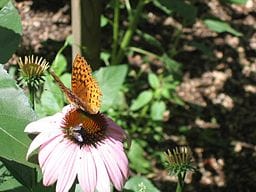Redlands Daily Facts
Linda Richards, Correspondent
One could say I’m on a bee kick.
I’ve written several articles about honeybees and the other 1,600 bee species in California.

I watch them on our landscaping here in Redlands, which features California natives and other habitat friendly plants, I observe the hive in the neighbor’s dead oak down the street and make forays to our pool to rescue the floating bees.
This spring I read Sue Hubbell’s “A Book of Bees,” a classic on beekeeping and a very well written book on life as a woman beekeeper in the Ozarks.
Toward the end, I had an `aha’ moment when she talked about how distressed she was when in making the rounds to her beeyards, she found 40 hives (with 20,000 minimum in a hive, that’s 800,000 bees) in the process of dying due to armyworm spraying in the area.
She went on to say big agriculture farming and its common pesticide use is rare in the Ozarks so it’s not as huge an issue as in other areas of the U.S.
A local beekeeper, Bill Romberg of Brian’s Living Bees, confirmed this, saying he’s lost hundreds of hives to pesticide spraying.
My Solution: Aside from avoiding pesticide use as much as possible, go organic in your gardening – and buy organic. I had overlooked the bee and other pollinator benefits of eating organic foods.
Research: Turns out there is lots of research backing this up, particularly in Europe, the leader in organics.
Organic brings lots more biodiversity. A study by The Soil Association compared organic and conventional farming in the United Kingdom and found organic farms had five times the wild plants, lots more birds and 160 percent the arthropods (insects) that the birds eat, including three times non-pest butterflies, one to five times as many spider numbers, and one to two times as many spider species.
Another benefit, a significant decrease in aphid numbers. (Source: “The Biodiversity Benefits of Organic Farming,” The Soil Association, May 2000)
It’s good for the economy, birds and bees. The Organic Farming Research Foundation, released a report headed by NYU Food Studies professor Carolyn Dimitri that showed organic farming is good for human health, job creation, the economy, soil and water, for birds and bees, and for slowing climate change. (Source: Organic Farming for Health and Prosperity)
Abundant predators control pests. A 21-year field trial initiated by the Research Institute of Organic Agriculture in Switzerland compared organic and conventional farming systems and in organics found higher earthworm and above ground insects, which improved growth conditions and more abundant predators that controlled pests. (Source: FiBL Dossier, Organic Farming Enhances Soil Fertility and Biodiversity, August 2000.)
GMO plants lead to higher herbicide use. A primary problem is GMO (genetically modified organism or genetically engineered) crops have led to the spread of herbicide-resistant superweeds and much higher use of Monsanto Co’s Roundup (glyphospate). (Stats show an increase from 11,000 tons in 1992 to 90,000 in 2007!)
Butterflies and bees are among the insects being impacted. There are many, many research articles on this but among them is research showing herbicides kill off butterfly host plants and some GMO blossoms are toxic to bees. (For more info see my website article on GMOs, which lists resources -GMO Food Concerns: Research to Ponder.
I asked Barbara Haumann at the Organic Trade Association to name the biggest misconception about organics, and she said people don’t understand natural versus organics.
“They assume natural means all the attributes of organic, but it doesn’t,” she said, explaining that unlike organic products, foods labeled natural are very poorly regulated, and often contain pesticides.
For myself – I’ve added `benefiting bees, butterflies and beneficial insects’ to my reasons to buy organic and use organic gardening principles.
Linda Richards lives in Redlands CA. Her website www.ifnaturecouldtalk.com is dedicated to speaking for our natural world. Contact her at [email protected]

